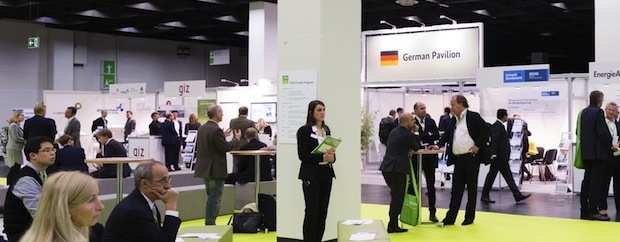
June 2016 - The Paris Agreement created a new framework for the international carbon market, placing sharper focus on advancing the goal of sustainable development than under the Kyoto Protocol and boosting climate policy ambition among the parties. But a number of major challenges must be surmounted before the Agreement can come into force, including in relation to market mechanisms.
In this regard, Carbon Expo 2016 was a milestone on the road to implementation of the Paris Agreement. International representatives from the governments of industrialised and emerging economies and from research, industry and civil society came together in Cologne from 25 to 27 May 2016 to address current trends, new technologies and innovative projects and services in the global carbon market in podium discussions, side events and a trade fair.
“This year’s Carbon Expo takes place at a turning point in international climate policy,” said Florian Pronold, Parliamentary State Secretary at the German Federal Environment Ministry in his welcome address, going on to highlight the huge potential of climate change mitigation for business: “The Paris Agreement sent out a good signal for the private sector.” Pronold emphasised the enormous technical and economic potential within business enterprises that is waiting to be unlocked by carbon market mechanisms.
Carbon Expo has been important for many years as a platform for exchange between key players in the carbon market, not least thanks to its wide variety of event formats. Notable among these this year were the side events organised by the German Federal Ministry for the Environment, Nature Conservation, Building and Nuclear Safety (BMU) and the German Emissions Trading Authority (DEHSt).
The first panel discussion – organised jointly by BMU and the International Carbon Action Partnership (ICAP) – focused on governance and perspectives for linking emissions trading systems (ETSs). The panelists were optimistic because the Paris Agreement provided a sound basis for linking ETSs. The key now, they said, is to push standardisation and centralisation in linked ETSs so as to aid joint governance in multilateral systems. They nonetheless agreed that there is a long way to go yet, because it is hard to second-guess the uncertainties in negotiations on ETS linking.
Another event by the DEHSt took up the issue of sustainable development in market mechanisms. The side event was based on recent findings of a research project, which formed the starting point for discussion by the invited panelists.
A further element of Germany’s participation in Carbon Expo 2016 was the German Pavilion. This included exhibits by eleven service providers and organisations involved in the further evolution and linking of international carbon markets. As a special feature this year, they supplemented the Carbon Expo conference programme and side events with a total of 18 presentations and talks over three days in which they discussed current issues with large numbers of visitors to the trade fair (see all presentations below). The DEHSt, for example, held a talk presenting the German government’s efforts to offset emissions from official travel, together with selected offset projects. Other discussions focused on the new market mechanisms after Paris and what needs to be done to get them up and running.
Despite the full conference programme, exhibitors were pleased with the strong attendance at presentations in the German Pavilion and the side events. Perspectives and Climate Focus jointly staged a range of events on innovative ways of linking market mechanisms and international climate finance, and on their potential for furthering sustainable development in African host countries. The active discussions, featuring African representatives on the panel, showed the strong level of interest in moving on from the Paris policy decisions to practical implementation of ambitious climate change mitigation measures.
Exhibitors were pleased with Carbon Expo 2016 overall. “As longstanding exhibitors, this year’s Carbon Expo was a welcome opportunity after COP 21 in Paris to refresh existing contacts in the professional community and forge new ones,” said Enno Harders, Head of Department at the German Emissions Trading Authority (DEHSt) in the Federal Environment Agency (UBA). Harders went on to say that Carbon Expo 2016 was the right moment to present the German government’s business travel offsetting project, complete with procedures and methodologies. “The project serves as a model for replication in the voluntary offsetting sector. Our aim in it is to boost climate change mitigation and mobilise new ideas and activities”.
While things are not moving forward quite as fast as expected, other exhibitors summed up that “the Paris Agreement has given new impetus to the future of market mechanisms.” Most of all, exhibitors at the German Pavilion were unanimous in their optimism for the months ahead and in their intention to be back at the next Carbon Expo.
Wednesday, 25 May 2016
Domestic Carbon Initiatives in Europe: Experiences and Opportunities (adelphi)
Linking the Clean Development Mechanism and the Green Climate Fund (Perspectives-Climate Focus)
ETS around the world - a guided tour (International Carbon Action Partnership - ICAP)
Assessing the missed benefits of INDCs - Quantifying potential co-benefits (NewClimate Institute)
Thursday, 26 May 2016
Upscaled crediting under the Paris Agreement (Perspectives)
New Market Mechanisms after COP21 in Paris (UBA/DEHSt)
Highlights from our latest research on ETS IV, MiFID II, and ESD II flexibility (FutureCamp)
Implementing NDCs: The Role of Markets and NAMAs (Perspectives)
Igniting CPA inclusion (GIZ Uganda/Uganda Carbon Bureau)
Friday, 27 May 2016
Cookie Settings
Marketing-Cookies werden von Drittanbietern oder Publishern verwendet, um personalisierte Werbung anzuzeigen. Sie tun dies, indem sie Besucher über Websites hinweg verfolgen.
Provider:
Statistik Cookies
Statistik-Cookies dienen der Analyse und helfen uns dabei zu verstehen, wie Besucher mit unserer Website interagieren, indem Informationen anonymisiert gesammelt werden. Auf Basis dieser Informationen können wir unsere Website für Sie weiter verbessern und optimieren.
Provider:
Erforderliche Cookies
Erforderliche Cookies sind für den reibungslosen Betrieb der Website zuständig, indem sie Kernfunktionalitäten ermöglichen, ohne die unsere Website nicht richtig funktioniert. Diese Cookies können nur über Ihre Browser-Einstellungen deaktiviert werden.
Provider: